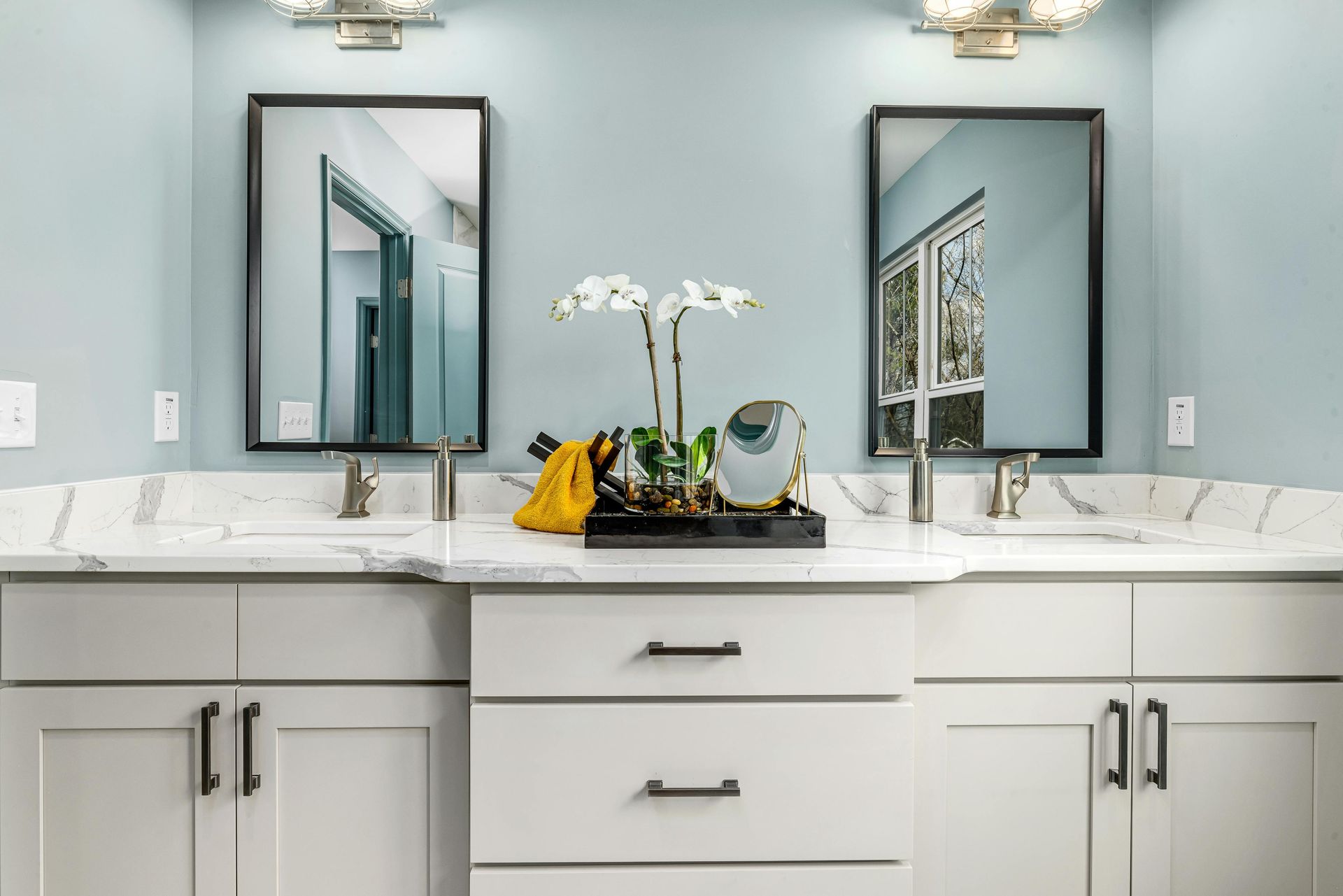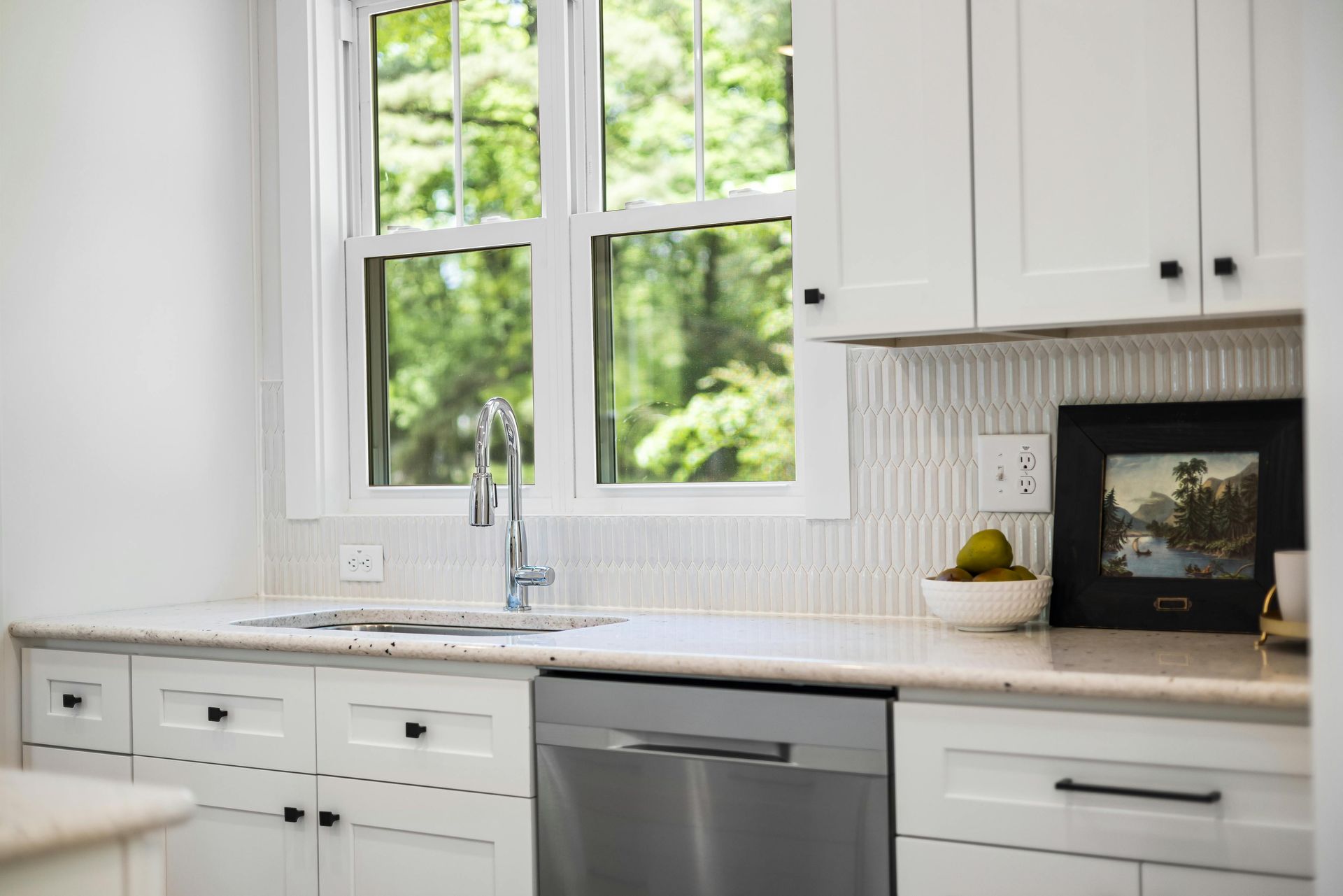
The Pros and Cons of Quartz Countertops: Is It the Right Choice for Your Home?
October 2, 2024
When it comes to choosing the perfect countertop material for your kitchen or bathroom, quartz has become one of the most popular options on the market. Known for its beauty, durability, and low maintenance, quartz countertops can elevate the style and functionality of any space. However, like all materials, quartz has its advantages and disadvantages. At JB Countertops LLC, we want to help you make an informed decision, so here’s a comprehensive look at the pros and cons of quartz countertops.
Pros of Quartz Countertops
1. Durability
Quartz countertops are engineered from one of the hardest minerals on earth, which makes them incredibly durable. Unlike natural stone like marble or granite, quartz is non-porous and highly resistant to scratches, chips, and cracks. This makes it an excellent choice for high-traffic areas such as kitchens and bathrooms. Homeowners who want a long-lasting surface with minimal wear and tear will find quartz to be an ideal solution.
2. Low Maintenance
One of the biggest advantages of quartz countertops is their low maintenance requirements. Since quartz is non-porous, it doesn’t require sealing like granite or marble. This makes it highly resistant to staining from substances like wine, coffee, and oils. Cleaning quartz is easy—just a simple wipe with warm water and mild soap is typically enough to keep it looking pristine. Busy homeowners or those who prefer a hassle-free countertop will appreciate how little upkeep is needed.
3. Wide Range of Styles
Quartz is engineered, which allows manufacturers to offer a wide variety of colors, patterns, and finishes. Whether you prefer a sleek, modern look with solid colors or a more natural appearance that mimics the look of marble or granite, quartz can be customized to match almost any design aesthetic. This versatility makes it an attractive option for homeowners who want to match specific themes or trends in their home.
4. Non-Porous and Hygienic
Since quartz countertops are non-porous, they don’t absorb liquids or bacteria. This makes them a hygienic option, especially in kitchens where food preparation is common. The non-porous nature of quartz also means that it’s highly resistant to mold and mildew growth, making it a healthier choice for your home.
Cons of Quartz Countertops
1. Cost
One of the main drawbacks of quartz countertops is the price. Quartz tends to be more expensive than materials like laminate, wood, or tile. Depending on the quality, brand, and installation costs, quartz can be comparable in price to high-end granite or marble. While the investment may be worth it for its durability and low maintenance, homeowners on a tight budget might find quartz out of reach.
2. Not Heat-Resistant
Though quartz is highly durable, it is not as heat-resistant as natural stone like granite. Extreme heat can cause damage to quartz surfaces, such as discoloration or cracking. Hot pots, pans, or appliances should not be placed directly on quartz countertops. Always use trivets or hot pads to avoid damaging the surface, especially if you frequently cook or use hot tools in your kitchen.
3. Visible Seams
Although quartz countertops are fabricated to fit custom spaces, large installations may result in visible seams where two slabs are joined. Depending on the color and pattern of the quartz, these seams may be more noticeable. While professional installation can minimize this issue, it’s something to consider if you’re seeking a perfectly seamless look.
4. Limited Outdoor Use
Quartz countertops are not recommended for outdoor kitchens or patios. Prolonged exposure to UV rays from the sun can cause the color to fade or become discolored over time. If you’re planning to install countertops in an outdoor space, natural stone like granite may be a better choice due to its higher resistance to the elements.
Quartz countertops offer a combination of beauty, durability, and ease of maintenance, making them a popular choice for many homeowners. With a wide range of design options and resistance to stains and scratches, quartz is ideal for those seeking a stylish and practical solution for their kitchen or bathroom. However, it’s essential to consider the drawbacks, including its cost, vulnerability to heat, and visible seams. At JB Countertops LLC, we’re here to help you weigh the pros and cons and find the perfect countertop for your Chicago home.

November 12, 2024
Your bathroom vanity countertop plays a crucial role in defining the style and functionality of your space. In a bustling city like Chicago, where homeowners prioritize both aesthetics and durability, choosing the right countertop for your bathroom is essential. Here’s a guide to selecting a stylish and durable vanity countertop that will elevate your bathroom and stand the test of time. 1. Why Choose Durable Materials for Your Bathroom Vanity? Bathrooms are high-moisture environments, and countertops are subject to daily use. From water splashes and cosmetics to hot styling tools, a bathroom countertop needs to withstand a lot. For Chicago homeowners, durable materials like quartz, granite, and solid surface are ideal choices. These materials are resistant to scratches, stains, and water damage, making them perfect for long-lasting beauty and functionality in your bathroom. Quartz is especially popular because it’s non-porous, meaning it won’t absorb water or harbor bacteria—a key feature for bathroom hygiene. It’s also available in a wide range of colors and patterns, from subtle neutrals to bold veining that mimics marble. Granite is another resilient option, offering natural beauty and unique patterns that add character to any bathroom. 2. Consider Low-Maintenance Options for a Busy Lifestyle In a fast-paced city like Chicago, homeowners often prefer low-maintenance materials that allow them to spend more time enjoying their homes and less time on upkeep. Quartz is a top choice because it doesn’t require sealing, and a simple wipe-down with a damp cloth keeps it looking pristine. Solid surface countertops, like Corian, also provide a seamless and stain-resistant option that’s easy to clean and repair if scratched. While marble is undeniably beautiful, it’s more porous and prone to staining, making it a higher-maintenance choice. For those who love the look of marble but want something more practical, quartz with marble-inspired patterns offers the best of both worlds: the elegance of marble with the ease of quartz. 3. Optimize Your Bathroom’s Style with Unique Colors and Textures Your bathroom countertop can be a stylish focal point, enhancing the overall aesthetic of the space. Modern bathrooms often favor clean lines and subtle elegance, so choosing a neutral countertop color, such as white, gray, or beige, can provide a timeless look. However, if you’re seeking something bolder, consider a rich, dark quartz or granite countertop to add depth and sophistication. Texture is another way to add style to your vanity countertop. Polished finishes give a smooth, shiny appearance that reflects light beautifully, creating a bright and airy feel in smaller bathrooms. Matte finishes, on the other hand, have a soft, understated elegance and are more forgiving of smudges and fingerprints. 4. Maximize Functionality with Custom Vanity Countertops Custom vanity countertops can be designed to fit your bathroom perfectly, whether you have a compact city condo or a spacious suburban home. Custom options allow you to select the exact dimensions, edge profiles, and sink configurations to optimize your countertop for both style and function. For smaller bathrooms, consider a floating vanity with a slim countertop to make the space feel larger and more open. 5. Invest in Long-Term Value Upgrading your bathroom with a high-quality vanity countertop is an investment that adds value to your home. In Chicago’s competitive real estate market, a well-designed, stylish bathroom can make a strong impression on potential buyers. Quartz and granite countertops, known for their durability and appeal, offer excellent resale value and are widely regarded as premium choices. Transforming your Chicago bathroom with a stylish and durable vanity countertop is a fantastic way to enhance both beauty and function. By choosing a material that suits your lifestyle and design preferences, you can create a bathroom that feels like a luxurious retreat while holding up to daily use.

November 12, 2024
Choosing the right countertop for your Chicago condo or apartment is an exciting opportunity to elevate the style and functionality of your space. Urban dwellers have unique needs when it comes to home design: square footage is often limited, lifestyle is fast-paced, and aesthetic preferences are typically modern and chic. Here’s a guide to help you select the perfect countertop that aligns with your style and meets the demands of condo and apartment living in Chicago. 1. Consider Durability for High-Traffic Spaces In smaller spaces, the kitchen often doubles as a gathering area and workspace, which means your countertop needs to be both durable and functional. Quartz is a popular choice for Chicago homeowners due to its incredible durability and minimal maintenance. It’s non-porous, stain-resistant, and easy to clean, making it ideal for urban settings where time is a luxury. Solid surface materials, like Corian, also offer durability and can be easily customized to fit tight or oddly shaped spaces. 2. Prioritize Low Maintenance for Busy Lifestyles Living in Chicago means you’re likely juggling a busy schedule, so choosing a countertop that doesn’t require constant maintenance is key. Granite and quartz are excellent low-maintenance choices, as they only need occasional sealing (in the case of granite) or a simple wipe-down (in the case of quartz). Marble may look luxurious, but its high maintenance requirements make it less ideal for condo and apartment dwellers who may not have time for frequent upkeep. 3. Maximize Limited Space with Light Colors and Seamless Designs Many condos and apartments in Chicago have smaller kitchens, so it’s essential to choose a countertop color and style that can make the space feel larger and more open. Light-colored countertops, such as whites, creams, and light grays, reflect more light and create an airy feel, which helps maximize limited square footage. Opting for a seamless, unbroken design—without busy patterns or grout lines—can further enhance the sense of spaciousness in a compact kitchen. 4. Add Urban Style with Unique Patterns and Bold Finishes For those looking to make a statement, consider countertops with unique patterns or finishes that reflect the urban vibe of Chicago. Concrete countertops have become increasingly popular, offering an industrial look that suits the modern, minimalist style seen in many downtown apartments. Alternatively, quartz options come in a variety of colors and patterns that mimic natural stone, allowing you to achieve a luxurious look with minimal maintenance. Matte finishes are also trending and can give your kitchen an upscale, contemporary feel. 5. Think About Installation in a High-Rise Building One important factor to consider in a condo or apartment setting is the installation process. High-rise buildings can present challenges for countertop installation due to elevator access, weight restrictions, and limited maneuvering space. Materials like quartz and solid surface are generally easier to work with in tight spaces, while heavier materials like granite may require extra planning. Always consult with a countertop professional to understand what’s feasible within your building’s limitations. 6. Invest in Resale Value with Timeless Choices If you plan to sell your condo or apartment down the line, consider countertops that will appeal to future buyers. Neutral colors, durable materials, and classic styles tend to hold value well and have universal appeal. Quartz and granite, in particular, are popular with potential buyers due to their durability and elegant appearance, making them a wise investment in terms of resale value. Choosing the right countertop for your Chicago condo or apartment doesn’t have to be overwhelming. By focusing on durability, low maintenance, space optimization, and urban style, you can create a beautiful and functional kitchen that fits seamlessly with city living.
Tell us about your next project idea
JB COUNTERTOPS, LLC | Copyright 2023 | All Rights Reserved | Website created by North Shore Web Services